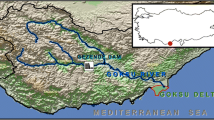Abstract
The management of the utilisation of natural resources from wetland ecosystems is a multiobjective and complex task. The creation of innovative decision making tools for sustainable wetland resource utilisation is an important challenge for the future. This is particularly crucial in the light of the growing shortages for high quality freshwater and the vanishing habitat for a large number of wetland fauna and flora species. Because wetlands combine attributes of both aquatic and terrestrial ecosystems, wetlands are often at the crossroads of a number of disciplines with no specific discipline of its own. Therefore, management programmes require a multidisciplinary approach founded on a systematic monitoring of key biological and physical parameters. A European Commission DG XII research project dedicated to the development of management tools for wetland resources in Latin America is being developed by a multidisciplinary team of researchers from eight universities, located in four EU member states, Argentina and Brazil. The study sites that will be utilised for this analysis are two shallow lakes in Northeast Argentina within the large (13 000 km2) wetland `Esteros del Ibera'. Continuous and periodic in-situ monitoring instrumentation has been installed in a long term monitoring programme of hydrological and meteorological factors, coupled with monthly biological and ecological data gathering. Potential future scenarios for wetland resource use are being discussed in a series of public meetings with key provincial and local actors (teachers, university professors, clergymen, local business persons and politicians). These meetings address both the small scale modifications of wetland use (water extraction for agriculture, tourism, controlled hunting) as well as regional projects related to the creation of large scale economic development (forestation, modification of nearby waterways for hydroelectric production and increased river transportation). Models are developed relating the chemical, physical, biological and ecological parameters monitored. These models will be dedicated to analysing the effects of development on wetland functions and resource quality. An economic model will be created to evaluate potential modifications in wetland functions in the local and regional socio-economic context. Evaluation instruments are developed and tested which include; qualitative models using loop analysis, goal functions based on the aquatic trophic web and the overall energy flux in the lagoon, and a geographical information system utilising satellite images. The purpose of these instruments is to examine the overall impacts of development alternatives on resource quality and ecosystem integrity, as well as demonstrating key parameters that should be more closely monitored. The final package will include an evaluation of the potential impacts of the development scenarios proposed by the key actors, recommendations to reduce specific impacts through alternative technologies, together with a monitoring programme and analysis tools for improved decision making in wetland resource management.
Similar content being viewed by others
References
Beccaceci, M. D., 1994. A census of marsh deer in Ibera Natural Reserve, its Argentine stronghold. Oryz 28: 131–134
Crouset, A., 1963. Investigaciones Geologicas en El Rincon de Santa Maria, Buenos Aires.
Jorgensen, S. E., 1982. A holistic approach to ecological modelling by application of thermodynamics. In Mitsch, W. et al. (eds), Systems and Energy. Ann Arbor, Michigan: 61–72.
Loiselle S. A & C. Rossi (eds), 1998. Environmental Change: Valuation Methods and Sustainable Indicators. European Commission, Luxemburg.
Loiselle S. A., G. M. Carpaneto, V. Hull & T. Waller, 1999. “Feedback analysis in reserve management: studying local myths using qualitative models” submitted to Ecological Modelling.
Micucci P. A. & T. Waller, 1995. Los Yacares en Argentina: Hacia un approvechamiento sustentable, Report for SUBTROPICA (Ciencia & Conservacion), Buenos Aires, Argentina.
Mitsch, W. J. & J. G. Gosselink, 1993. Wetlands. Van Nostrand Reinhold, New York.
Neiff, J. J., A. A Bonetto, A. P. de Neiff, M. A. Corrales, D. Roldan, M. Varela, M. M. Rivero & M. A. Salusso, 1977. Introduccion al estudio ecologico del Sistema Ibera. VII Congreso Latinamericano de Zoologia, Tucaman Argentina.
Puccia, C. J. & R. Levins, 1985. Qualitative Models of Complex Systems. Harvard University Press, Cambridge, MA (U.S.A.).
Quintana, R. & A. Parera, 1994. El carpincho: un recurso que espera. Anales de la Sociedad Rural Argentina, CXXVI: 19–22.
Quintana, R. & J. Rabinovich, 1993. Assessment of capybara (Hydrochoerus hydrochaeris) populations in the wetlands of Corrientes, Argentina. Wetlands Ecol. Manage. 2: 223–230.
Scheffer, M., 1998. The Ecology of Shallow Lakes, Chapman & Hall, London.
Ulanowicz, R. E., 1986. Growth and Development: Ecosystem Phenomenology. Springer Verlag, New York.
Ulanowicz, R. E., & L. Abaca-Arenas, 1997. An informational synthesis of ecosystem structure and function. Ecol. Mod. 95: 1–10.
Waller, T. & P. A. Micucci, 1993. Situación del género Caiman en Argentina. Apuntes sobre su distribución, situación poblacional y comercio histórico. In Memorias del IV Workshop sobre Conservación y Manejo del Yacaré Overo Caiman latirostris. ‘La Región’-Fundación Banco Bica. Santa Fe, Argentina: 40–49.
Author information
Authors and Affiliations
Rights and permissions
About this article
Cite this article
Loiselle, S., Rossi, C., Sabio, G. et al. The use of systems analysis methods in the sustainable management of wetlands. Hydrobiologia 458, 191–200 (2001). https://doi.org/10.1023/A:1013185624563
Issue Date:
DOI: https://doi.org/10.1023/A:1013185624563




